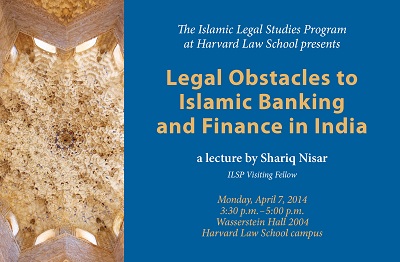Largest number of speakers and delegates participating from India
“The Harvard University Forum on Islamic Finance was introduced in 1997 to engage scholars, practitioners and regulators in productive dialogue about the then-nascent field. Previous forums have focused on recent economic and political developments in Muslim-majority societies, innovation and authenticity, the global recession, and points of contact between Islamic finance and other types of ethical finance” said Dr. Shariq Nisar, Visiting Fellow, ILSP, Harvard Law School.
According to Dr. Shariq “Islamic finance literature frequently refers to economic justice, equitable distribution of opportunity and wealth, ethics, morality, equity, and fairness in business dealings. Critics, however, contend that the current practice of Islamic finance is not adequately informed by such ideals. Can cooperative financial models such as takaful facilitate the development and growth of financial solutions that more clearly reflect the ideals of Islamic finance?”
“The Eleventh Forum seeks to reassess and critically engage with issues of risk sharing, mutuality, solidarity, and socioeconomic welfare in the context of a discussion about takaful and other types of cooperative financial solutions,” Shariq added.
The Forum will be a two-day conference, structured around three plenary sessions and six smaller parallel sessions. A formal banquet dinner will be held at Harvard on the evening of April 26, followed by a speech by one of the forum luminaries. A schedule of this event will be posted soon.
Papers are requested on the following sub-themes:
MUTUALITY: CHALLENGES AND ISSUES
Mutuals and cooperatives are relatively rare in the Islamic financial services sector. Is there a need for a greater number of mutuals and cooperatives to replace the debt-based products predominantly being offered? What factors (profitability, business models, legal/regulatory frameworks, government support, etc.) could problematize the development and growth of Islamic financial products and institutions based on the concept of mutuality?
Topics:
• Alternative models and their associated challenges
• Investment models and profitability
• Shari‘a-related, legal, regulatory and governance concerns
• Points of contact between takaful, mutual banking and other cooperative financial solutions
• Surveys of pre-modern and modern cooperative financial products and trends in practice
RISK-SHARING
The theoretical literature emphasizes the significance and benefits of risk-sharing, as opposed to risk-shifting. What factors complicate the sector’s on-going effort to develop and encourage the evolution of solutions that favor risk-sharing over risk-shifting?
Topics
• Innovative risk-sharing and the challenges of product development
• Risk-sharing: social concern or commercial venture?
• Analyses of various risk-sharing and risk-shifting models and approaches
• The theoretical and empirical significance of various risk-sharing models and approaches
• Risk-sharing in the context of takaful and other types of cooperative finance
MARKET PENETRATION: STRATEGIES AND ACTIONS
Various factors contribute to the relatively low penetration of certain financial products in Muslim communities. What role might Islamic finance in general–and takaful, in particular–play in changing this state of affairs?
Topics
• Obstacles to the growth of Islamic finance, particularly takaful (e.g., lack of effective distribution; lack of human capital and capacity; ineffective financial architecture and unsatisfactory track record)
• Increasing the penetration of Islamic finance with particular regard to takaful in Muslim-majority societies, and Muslim communities in Muslim-minority societies
• Resources and strategies for the establishment and development of Islamic cooperative finance institutions
SOCIO-ECONOMIC BENEFITS
Critics contend that the prevailing practice of Islamic finance is not sufficiently informed by its theoretical ideals and that it offers little, if anything, that is not already offered by conventional finance. To what extent is such criticism valid? And if so, how can Islamic finance be “re-connected” to its ideals?
Topics:
• Lessons that conventional cooperative finance (e.g., credit unions, building societies, cooperative/mutual banks, etc.) and Islamic finance can learn from each other
• Alternative Islamic financial ecosystems
• The impact-driven design of Islamic financial products (especially takaful) to serve low-income and at-risk members of society
• The implementation and execution of takaful and other “social” shari‘a-compliant practices (e.g., zakat, waqf and microfinance)
EMERGING ACADEMIC RESEARCH AND FUTURE DIRECTIONS
As in previous Forums, a section will be devoted to advanced graduate-level research in Islamic cooperative finance and related aspects. Students are encouraged to submit their works for consideration.
ABOUT THE ISLAMIC FINANCE PROJECT
The Islamic Finance Project (IFP) is the continuation of the Harvard Islamic Finance Information Program (HIFIP), which was established by the Center for Middle Eastern Studies in 1995. IFP is now part of the Islamic Legal Studies Program (ILSP) at Harvard Law School. It aims to study the field of Islamic finance from legal and shari‘a points of view by analyzing contemporary scholarship, promoting collaboration among scholars within and outside of the Muslim world, and increasing the interaction between theory and practice in Islamic finance.
Since IFP’s inception, and particularly over the last ten years, the subject of Islamic finance has attracted growing interest among academics, students and professionals around the globe. In addition to the above-listed forums, the IFP also hosted specialized workshops on topics such as “tawarruq,” “sukuk,” “Risk Management in Islamic Finance,” “Micro-Finance: Toward a Sustainable Financial Model.,” “Reappraising the Islamic Financial Sector” and “Insolvency and Debt Restructuring in Islamic Finance.” The Project also assists students and other researchers with advice on and direction to the academic resources, as well as through sponsoring other events such as panel discussions on “Could Islamic Finance Have Prevented the Crisis?” and “Bankruptcy, Financial Distress, and Debt Restructuring.”. IFP attracts luminaries to deliver lectures and seminars, including Robert Merton who delivered the keynote speech on “Innovation in Islamic Finance” at the Eighth Harvard University Forum.
Source: Islamic Finance Project, Harvard University, USA






0 Comments